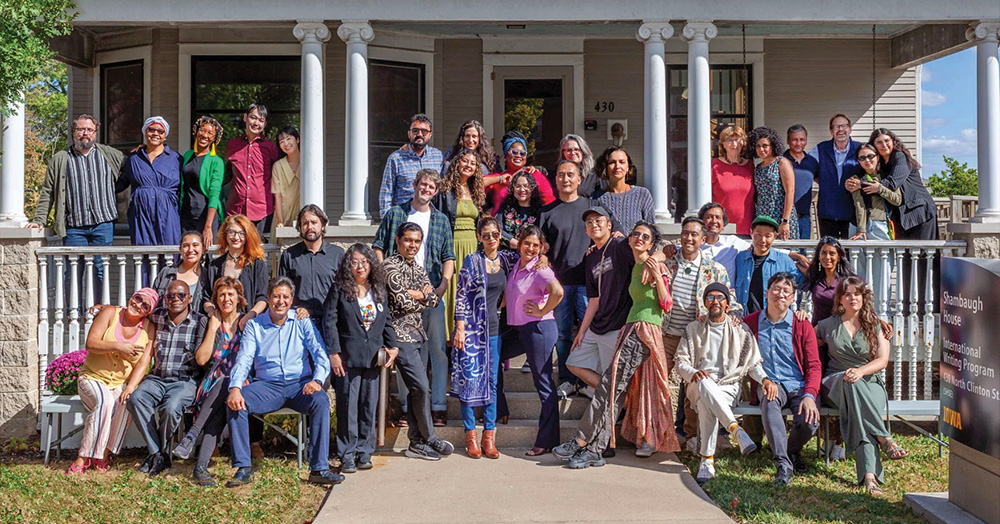Iowa’s International Writing Program Faces an Uncertain Future
 PHOTO COURTESY INTERNATIONAL WRITING PROGRAM
The 2024 International Writing Program participants gather at the Shambaugh House.
PHOTO COURTESY INTERNATIONAL WRITING PROGRAM
The 2024 International Writing Program participants gather at the Shambaugh House.
Earlier this summer, poet and professor Christopher Merrill traveled to New York, where the literary arts organization Words Without Borders presented him with the 2025 Ottaway Award for the Promotion of International Literature. The event was a celebration of Merrill and the 25 years he’s served as director of the University of Iowa’s International Writing Program, which has become a cornerstone of the global literary exchange. Yet even as the crowd applauded his achievements, recent events cast a shadow over the ceremony.
 PHOTO: TIM SCHOON/UI OFFICE OF STRATEGIC COMMUNICATION
Director Christopher Merrill has led the International Writing Program the past 25 years.
PHOTO: TIM SCHOON/UI OFFICE OF STRATEGIC COMMUNICATION
Director Christopher Merrill has led the International Writing Program the past 25 years.
Federal funding cuts this year have clouded the future of the acclaimed Iowa program. In February, the U.S. Department of State notified Merrill that three grants totaling more than $950,000 through the department’s Bureau of Educational and Cultural Affairs were being terminated. The grants no longer aligned with “agency priorities and national interest,” the State Department informed the IWP.
“It is difficult for me to believe that creating a forum for writers from different countries to exchange ideas, works, and impressions does not contribute to a dialogue central to democracy,” Merrill said at the event. “Indeed, from the IWP’s origin in 1967, we have prided ourselves on our ability to respond to changing political circumstances and global affairs.”
Later in June, Merrill was back in his office in the Shambaugh House, home to the IWP, where he and his staff sorted through the financial and logistical challenges of welcoming this year’s class of visiting residents. In addition to the funding cuts, U.S. travel bans and restrictions put the visas of some writers invited to Iowa City in limbo, Merrill said.
The IWP has invited 21 poets and writers to its scaled-back residency this semester, down from the typical 30 to 40 who spend 11 weeks writing and studying each fall in Iowa City. The residents—who receive lodging at the Graduate Hotel—participate in public readings, panel presentations, field trips, cultural events, and literature courses with UI students. Of the 1,625 writers who have participated since 1967, at least 70 percent were wholly or partially funded by the State Department and its various agencies, according to the IWP.
Telling a Global Story
The UI’s International Writing Program was founded in 1967 by the late Iowa Writers’ Workshop director Paul Engle (32MA) and his wife, novelist and translator Hualing Nieh Engle (66MFA), who died in 2024. Since its opening, the IWP has:

Hosted more than 1,600 established writers from 160-plus countries.

Organized 40-plus Lines & Spaces exchanges and summits in countries or regions with a relatively sparse history of literary relations with the U.S.

Taken more than 170 American authors abroad.

Produced three Nobel laureates, including 2024 winner Han Kang, a 1998 IWP participant from South Korea.

Held programming in dozens of U.S. cities, including 124 events in more than 20 cities over the past three years alone.
The loss of its federal grants amounts to about half of the IWP’s total annual operating budget, says Merrill. This fall’s residency was only made possible by the IWP endowment and a combination of longtime funding partners, including donors, grants, foreign ministries of culture, and nongovernmental organizations. The program also received a $250,000 gift this past spring from Hugh F. Culverhouse Jr., an investor and lawyer from Sarasota, Florida, who has donated extensively to under-resourced arts and community organizations around the nation.
Still, the program was forced to eliminate three staff positions and abruptly halt programming beyond its core residency. In past years, the IWP has hosted the two-week Between the Lines summer program for high school students from around the world; sent American writers abroad through its Lines & Spaces program; created resources like WhitmanWeb, which translated the poetry of Walt Whitman into dozens of languages; and developed programs like Book Wings, which brought together American and Russian playwrights.
“All those kinds of projects, they’ve been a part of my tenure here, and now they’re all gone,” says Merrill. “So my job is to figure out what this will look like going forward.”
One of Merrill’s proudest achievements at the IWP was leading Iowa City’s effort to earn its designation as a UNESCO City of Literature in 2008. At the time, Iowa City was just the third location in the world to hold the honor and first in North America. Today, there are 53 Cities of Literature worldwide, and Merrill is exploring how to strengthen those partnerships and create new opportunities for international communities to send writers to Iowa.
As it happened, June was supposed to be Merrill’s final month at the helm of the IWP. The original plan, he says, was to transition back into teaching and help hire a new director ahead of the coming academic year. But the current situation has meant that Merrill remains at Shambaugh House, for now, as he attempts to stabilize the program, identify new funding sources, and find a path forward.
“I’m getting a little long in the tooth, and I would love to hand this program to somebody young with the energy to go out and build anew in the way that I did when I came here,” says Merrill, who has significantly expanded the IWP by increasing the number of countries that send writers to Iowa.
Each August, as the latest group of residents arrives in Iowa, Merrill shares the same message: He hopes they will write many new pages, make many new friends, and gain many new impressions of the U.S. and its literary traditions. He’s hopeful that this City of Literature—and his country—can continue to create those opportunities for writers for the next 25 years.
